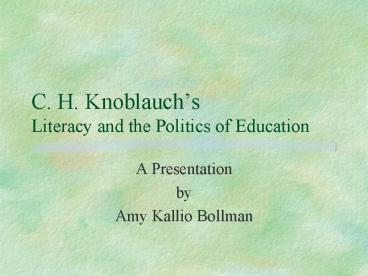C' H' Knoblauchs Literacy and the Politics of Education - PowerPoint PPT Presentation
1 / 15
Title:
C' H' Knoblauchs Literacy and the Politics of Education
Description:
'Literacy' cannot be defined concretely because it is an abstract concept. ... literacy' by pointing out the benefits of the status quo (presuming some exist) ... – PowerPoint PPT presentation
Number of Views:537
Avg rating:3.0/5.0
Title: C' H' Knoblauchs Literacy and the Politics of Education
1
C. H. KnoblauchsLiteracy and the Politics of
Education
- A Presentation
- by
- Amy Kallio Bollman
2
Knoblauchs Thesis
- Literacy cannot be defined concretely because
it is an abstract concept. Therefore, each
definition of literacy depends on the political
view of the person who defines it. Definitions
of literacy can be used to maintain or subvert
a status quo--and those being made literate in
a given way are being remade in a way that will
benefit the person(s) who defined that literacy.
3
Knoblauchs Literacies
- Functional Literacy
- Cultural Literacy
- Literacy-for-personal-growth
- Critical Literacy
4
Functional Literacy
- Knoblauch says that functional literacy
benefits the capitalist class--which has the most
to gain by having workers who are literate enough
to perform tasks and to obey written rules, but
not literate enough to think critically about
the tasks they are performing (especially if they
endanger themselves or someone else) or to
question the written rules.
5
Cultural Literacy
- Knoblauch says that cultural literacy
benefits those who are threatened by cultural
diversity--who would impose one culture as the
correct one and force all others to become
familiar with it (therefore, lessening the impact
of other cultures). Knoblauch refers to
cultural and functional literacy as
conservative.
6
Literacy-for-personal-growth
- Knoblauch attributes this brand of literacy to
liberal views, especially of educators. This
brand has much power because it appeals to the
expressive individualism which is greatly
valued in America. However, literacy-for-persona
l-growth can be made to benefit the status quo
because it limits change to the individual and
does not promote class awareness.
7
Critical Literacy
- Critical literacy, the ability to read and
understand the real world implications of what
one reads--be it a book or a social trend or an
advertisement--is attributed by Knoblauch to the
radical left. Since it is designed make people
question the status quo, it is deemed to be
dangerous to the status quo. Knoblauch says it
is resisted by the establishment--particularly
educators.
8
Empowerment
- Knoblauch implies that all those who talk
about literacy imply that being able to read
and write (print literacy) necessarily makes one
more powerful and capable--but he points out
that other cultures have survived with neither
the ability to read or write. He asks if being
trained to read and write benefits the individual
or just a culture which is largely dependent on
print.
9
Knoblauchs Proof
- In my opinion, Knoblauch offers little proof
of his argument in the form of examples or
statistics. His argument depends on a chain of
reasoning which one must be willing to follow
without question. Though he has some excellent
points, finding proof might have caused him to
rethink his points and make them more persuasive
to those who dont already agree.
10
First point to consider about Knoblauch
- When someone is taught to read and write only on
a basic level--to benefit those who only want him
to read and write on that level--is that person
necessarily going to stop learning now that s/he
has the ability to read and access to many forms
of text?
11
Second point to consider about Knoblauch
- While it is true that it is the industrialized
West which prizes literacy above all, are
non-industrialized societies unaffected by
literacy because there is no internal need for
literacy? Wouldnt it be to the benefit of a
non-industrialized society to have some
literate people to protect it from exploitation
by an industrialized society?
12
Third point to consider about Knoblauch
- Is cultural literacy necessarily limited to
literacy in one culture? Isnt multicultural
literacy a form of literacy worth considering?
Would it be as extreme as critical literacy, or
would it be compatible with critical literacy,
or might it modify critical literacy by
pointing out the benefits of the status quo
(presuming some exist)?
13
First Essay Exam Question
- Is literacy-for-personal-growth really as
pervasive in the educational establishment as
Knoblauch thinks it is? If we consider Anyons
points about the different types of educational
systems, and Kozols description of one lower
class system, which type of system actually does
promote this kind of literacy, and why? Which do
not, and why?
14
Second Essay Exam Question
- Think about the black women writers mentioned
by Royster in terms of Knoblauchs assumptions
about literacy Knoblauch suggests that
literacy is taught by an establishment to the
illiterate (whether it is in school or an
adult literacy program) he suggests that
functional literacy is limiting he suggests that
critical literacy is a new concept of the radical
left. Do Roysters specific examples support
Knoblauchs points? If so, how so? If not, how
would you modify his points to account for black
women writers?
15
The End
- C. H. Knoblauch
- Literacy and the Policies of Education
- Presentation by Amy Kallio Bollman






![Education and Skills Online [based on the Survey of Adult Skills (PIAAC)] PowerPoint PPT Presentation](https://s3.amazonaws.com/images.powershow.com/7615216.th0.jpg?_=20160217065)
























